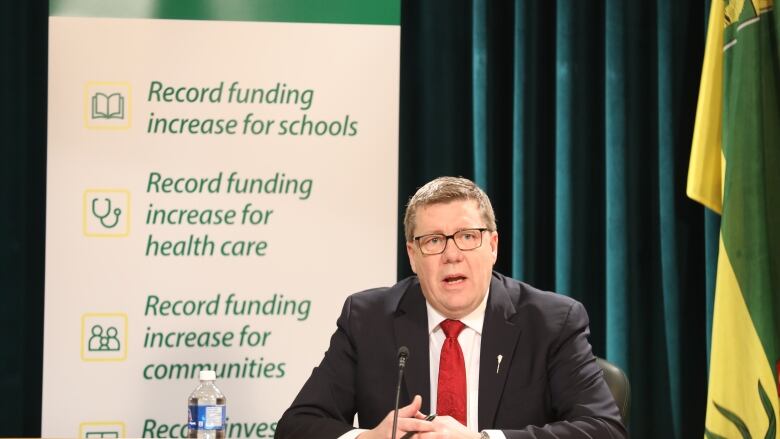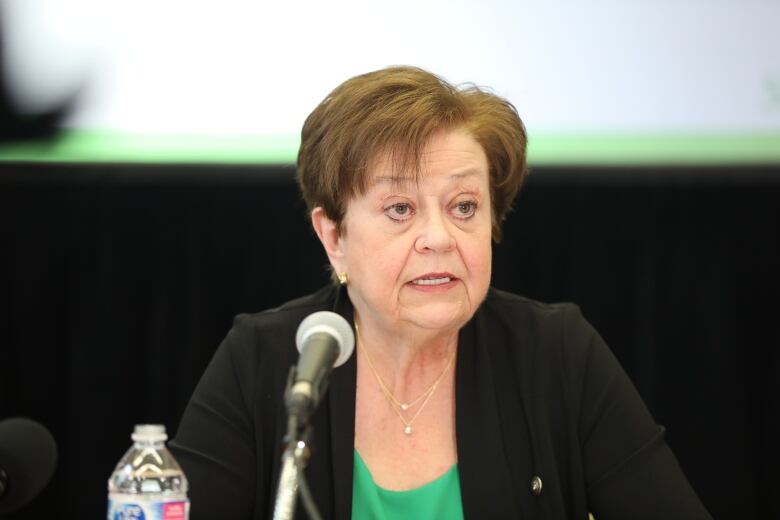Why Sask. is touting record spending in its budget and why that claim needs context
Province focused budget messaging on spending in health, education and communities

The Saskatchewan government has tabled its 2024-25 budget, which features a$273.2-million projected deficitand one key message: record investment in multiple areas.
Finance Minister Donna Harpauer said it repeatedly in her news conference on the budget.
"This year's budget makes record new investment in classrooms, care and communities," Harpauer said.
Premier Scott Moe attempted to hammer home that message even further during his own news conference.
Moe satin front of a banner that displayed the phrases "Record funding increase for schools,""Record funding increase for health care" and "Record funding increase for communities."
The claims are true.Take the $7.6 billion the province is putting toward the Ministry of Health. That's up from $6.9 billion in last year'sbudget.
The Ministry of Education which administers pre-K-12 schools, early learning, child care and librarieswill receive $3.3 billion. That's an increase of $247.8 million from the 2023-24 budget.
But experts say these statements deserve some context.
Haizhen Mou, a professor at the Johnson Shoyama Graduate School of Public Policy,said the Saskatchewan Party made a "bold" decision to increase spending, despite only a 0.9 per cent or $184.2 million increase to its revenue.
"This is a historically high amount of spending on everything: health care, education, and the capital [budget],"Mou said.
"However, considering inflation and also population growth, this is kind of normal."
Inflation means that everything is getting more expensive. Combined with a growing population, this means the province has to spend more just to provide the same services.

So with "record" spending perhaps not being as dramatic as it was painted by the province, why put so much focus on it?
The experts CBC spoke with say touting the claim is one way to add some juice to a budget that is generally pretty "boring."
Many of the new announcements in the budget were teased in the weeks ahead of the document being tabled in the legislature and the deficit was the only real surprise, saidJim Farney, the Regina director of the Johnson Shoyama Graduate School of Public Policy.
"They are making this choice by increasing spending on the program side," Farney said.
"Ithink that is akind of clear political decision they've made that maybe it is more important to invest in public services than it is to emphasize a balanced budget over everything else."
There's also another factor in play, according to Mou.
"It's partially driven by the election, but partially it signals that they are confident thatthey can make an investment right now andpave the path for the next term," she said.
Even the budget's name "Classrooms, Care and Communities" is a good indication of the province's shift in priorities this fiscal year, Mou said.
She described the decision to put classroom before words like health-care as"interesting" since health care is often an election issue.
Mou said the goal was likely to address the issue of the ongoinglabour dispute with the Saskatchewan Teachers' Federation.
"This year they want to solve this immediate problem,kind of relieve this immediate pressure, by spending way more on education compared with health care and social service, for example," Mou said.
Mousaid it is too early to say whether that is a message that will get through to parents or voters.
She said it'll be something worth watching as the province moves toward an election later this year.













_(720p).jpg)


 OFFICIAL HD MUSIC VIDEO.jpg)
.jpg)



























































































